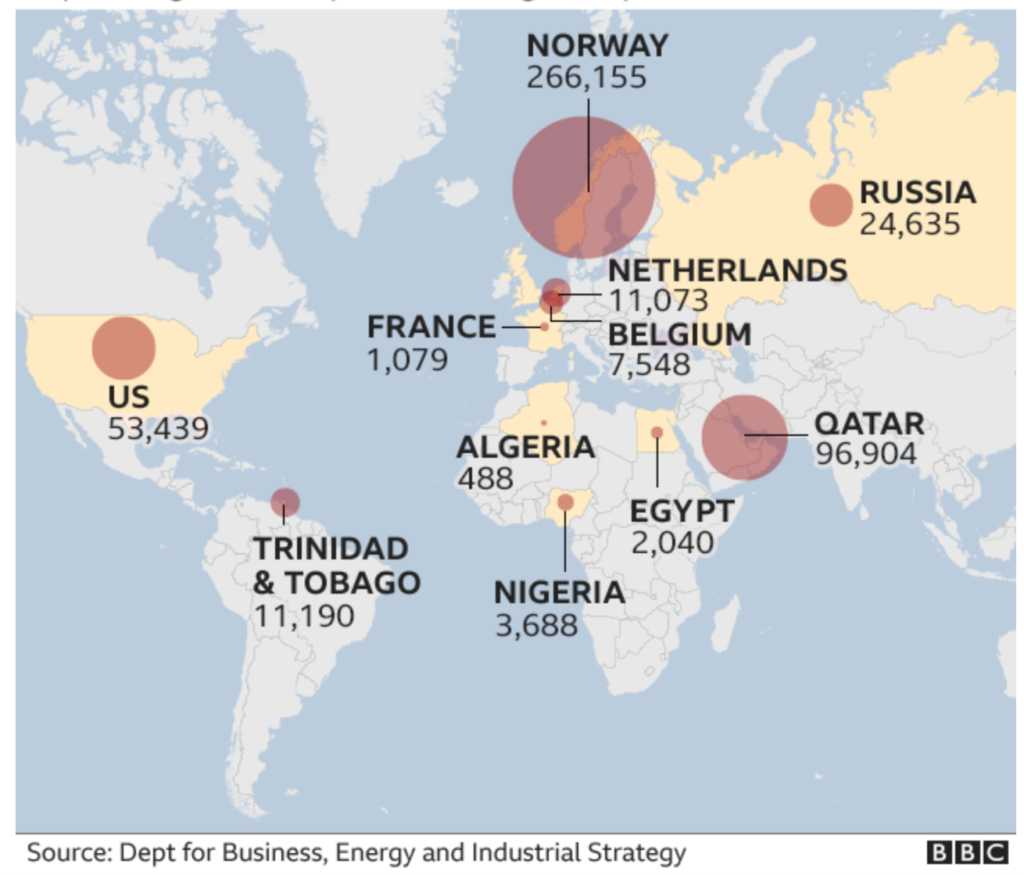We have been a large producer of gas since the 1960s. Output, however, has fallen since 2000, despite demand continuing to rise. The UK imports over 50% of gas. A lot of this comes from Norway, Netherlands and Belgium. Russia supplies less than 5% of the UK’s gas.
Due to our lack of home-produced gas, thanks to the lack of storage facilities, we need to buy gas in large quantities on the wholesale market. The wholesale gas market has been subject to price increases recently. This has caused a spike in prices, which is having a devastating impact on the price of gas and general affordability.
Pipeline gas and liquid natural gas imports 2020:

The Perfect Storm:
A perfect storm has been brewing for a while. Last winter was cold in many places around the globe. This depleted the amount of available gas. The reserves are usually replenished over the summer. However, production dropped because many nations were catching up with maintenance, which was postponed due to lockdowns. To make things worse, calm weather reduced the amount of electricity produced by wind power. The result of this is that gas wholesale prices have more than quadrupled over the last year.
The UK has been so badly hit as around 85% of our homes use natural gas as their main central heating source. October’s increase in the fuel cap (the maximum customers will be charged for gas) means price increases are going to happen. Most large domestic suppliers buy their gas in advance, known as hedging, so they have yet to pass on the price increase to their customers. However, the fuel cap is likely to rise again in April. Wholesale gas prices are unlikely to drop until storage facilities fill up again, which is not likely until the spring.
What can you do?
If you’re struggling with increasing gas prices there is help at hand. In the first instance, you could contact Citizens Advice they have a huge amount of information available. They offer suggestions such as;
.
- Agreeing a payment plan with your supplier – Tell your supplier that you want to pay off your debts in instalments as part of a payment plan. You’ll pay fixed amounts over a set period of time, meaning you’ll pay what you can afford. The payment plan will cover what you owe plus an amount for your current use.
.
- Pay off your debt through your benefits – You might be able to repay your debt directly from your benefits through the Fuel Direct Scheme. A fixed amount will automatically be taken from your benefits to cover what you owe, plus an extra amount for your current use.
.
Save Money – Quick Wins:
While we can say invest in low energy usage appliances or have your home triple glazed, these things cost money. So while these are important points for the future, for the here and now, if you’re struggling – like a lot of people are, here are some quick points to help you now;
- Layering up on warm clothes
- Turn down your thermostat
- Draught-proof your property (plug gaps in doors and windows with sealant and foam available at supermarkets)
- Monitor your usage – Could you turn your heating on 1hr later and turn off 1hr earlier each day?
- Check the weather forcast – if you know it’s going to be mild, could you cope with having a heating free day?
- Don’t heat rooms you don’t use – or don’t use that often
.